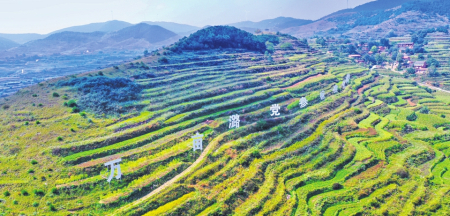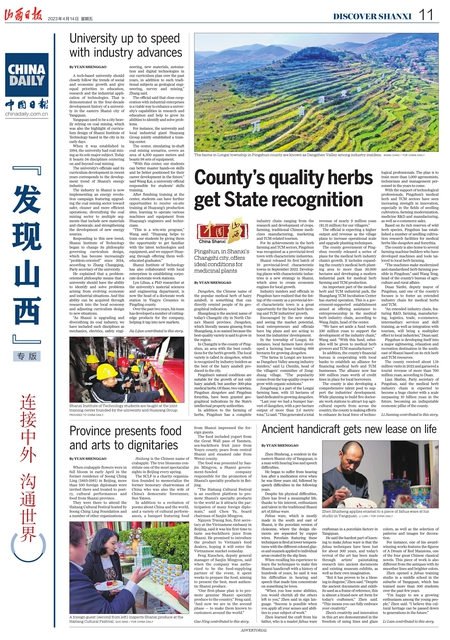County’s quality herbs get State recognition

The farms in Longxi township in Pingshun county are known as Dangshen Valley among industry insiders. Wang Chao / For China Daily
Dangshen, the Chinese name of the popular medical herb of hairy asiabell, is something that can directly remind people of its geographical indication.
Shangdang is the ancient name of today's Changzhi city in North China's Shanxi province. Dangshen, which literally means ginseng from Shangdang, is so named because the best-quality variety is said to grow in the region.
In Changzhi, the county of Pingshun is an area with the best conditions for the herb's growth. The local
variety is called lu dangshen, which is recognized by industry insiders as the best of the hairy asiabell produced in the city.
Pingshun's natural conditions are suitable for the growth of not only hairy asiabell, but another 300-plus medical herbs. Of these, two varieties, Pingshun dangshen and Pingshun forsythia, have been granted geographical indications by China National Intellectual Property Administration.
In addition to the farming of herbs, Pingshun has a complete industry chain ranging from the research and development of crops, farming, traditional Chinese medicines manufacturing, marketing and TCM-related tourism.
For its achievements in the herb farming and TCM sectors, Pingshun was recognized as a provincial-level town with characteristic industries.
Shanxi released its first batch of 10 provincial-level characteristic towns in September 2022. Developing places with characteristic industries is a new strategy in Shanxi, which aims to create economic engines for local growth.
Industry insiders and officials in Pingshun have realized that the listing of the county as a provincial-level characteristic town is a great opportunity for the local herb farming and TCM industries' growth.
Encouraged by the new status and seeing the market potential, local entrepreneurs and officials have big plans and are acting to boost the industries' development.
In the township of Longxi, for instance, local farmers have developed a farming base totaling 666 hectares for growing dangshen.
"The farms in Longxi are known as Dangshen Valley among industry insiders," said Li Chenlin, head of the villagers' committee of Zongshang village. "The popularity comes from the top-quality crops we grow with organic solutions."
Zongshang is a part of the Longxi farming base, with 53 hectares of land dedicated to growing dangshen.
"Last year we had a bumper harvest of dangshen, with a per-hectare output of more than 2.6 metric tons," Li said. "This generated a total revenue of nearly 9 million yuan ($1.31 million) for our villagers."
The official is expecting a higher output and revenue as the village plans to increase operational scale and upgrade planting techniques.
The county government of Pingshun recently released a series of plans for the medical herb industry chain's growth. They include expanding the county's medical herb planting area to more than 30,000 hectares and developing a modern industrial park for medical herb farming and TCM production.
An important part of the medical herb and TCM industrial park, the Shangdang TCM Incubation Center has started operation. This is a government-supported establishment aimed at offering assistance to entrepreneurship in the medical herb industry chain, according to Wang Jinjin, head of the center.
"We have set aside a fund worth 230 million yuan to support the development of the industry chain," Wang said. "With this fund, subsidies will be given to medical herb growers and TCM manufacturers."
In addition, the county's financial bureau is cooperating with local banks to establish an alliance for financing medical herb and TCM businesses. The alliance now has 500 million yuan worth of credit lines in place for local borrowers.
The county is also developing a comprehensive talent pool to support the industries' development. While planning to build five doctorate work stations to attract top agricultural experts from across the country, the county is making efforts to enhance its local force of technological professionals. The plan is to train more than 1,000 agronomists, technicians and management personnel in the years to come.
With the support of technological professionals, Pingshun's medical herb and TCM sectors have seen increasing strength in innovation, especially in the fields of seedling cultivation, farming modernization, and medicine R&D and manufacturing, as well as e-commerce sales.
Based on its rich reserves of wild herb species, Pingshun has established a number of seedling cultivation research facilities for medical herbs like dangshen and forsythia.
The county is also home to several farming machine builders who have developed machines and tools tailored to local herb farming.
"The machines make modernized and standardized herb farming possible in Pingshun," said Wang Teng, head of the county's bureau of agriculture and rural affairs.
Duan Yanfei, vice-mayor of Pingshun, said one of the county's focuses is to foster an extended industry chain for medical herbs and TCM.
"An extended industry chain, featuring R&D, farming, manufacturing, logistics, trade, e-commerce, intermediary services and skill training, as well as integration with tourism, will bring a multiplier effect to local industries," Duan said.
Pingshun is developing itself into a major sightseeing, relaxation and recreation destination in the southeast of Shanxi based on its rich herb and TCM resources.
The county received about 1.18 million visits in 2022 and garnered tourist revenue of more than 700 million yuan, according to Duan.
Lian Shubin, Party secretary of Pingshun, said the medical herb industry chain is expected to become a huge cluster with a scale surpassing 10 billion yuan in the future, becoming an indisputable economic pillar of the county.
Li Jiaming contributed to this story.
By Yuan Shenggao











